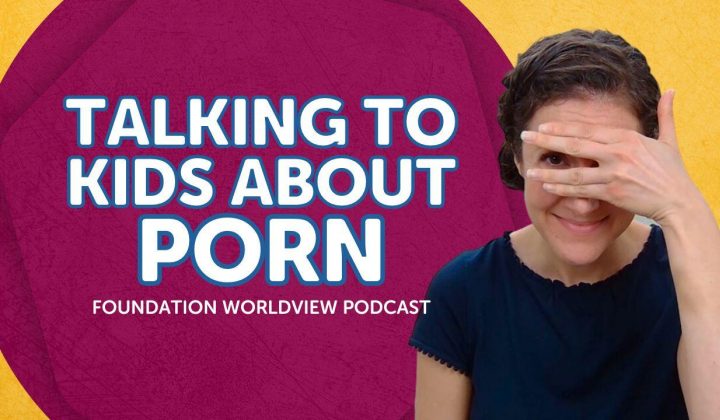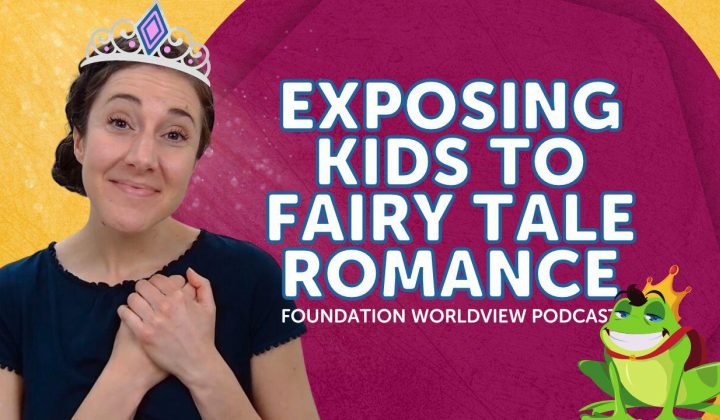Learn more about the journey that led to us equipping kids to carefully evaluate every idea they encounter.
Meet members of our team who have contributed to curriculum development.
Hear from real users of the Foundation Curriculum.
Learn what we believe about God, Jesus, Scripture, and more.
Teaching Your Child Christian Values
In this episode, Elizabeth Urbanowicz responds to the question, "How can I teach my children Christian values?" Listen as Elizabeth explores that goal and desired outcome in wanting to raise children with Christian values, but from a biblical worldview.
Resources Mentioned:
Transcript
Note: The following is an auto-transcript of the podcast recording.
Hello friends, and welcome to another episode of the Foundation Worldview Podcast where we seek to answer your questions so that you can equip the children that God has placed in your care to carefully evaluate every idea they encounter and understand the truth of the biblical worldview. I'm your host, Elizabeth Urbanowicz and I'm thrilled that you've joined me for another episode today. Today's question is short and sweet and it says, how can I teach my children Christian values? Interesting question that we're going to dive down deep into.
But before we do that, if you have a question that you would like answered on a future Foundation Worldview Podcast, you can submit it by going to FoundationWorldview.com/podcast. Also, if you have found the content of this podcast beneficial, we ask that you would consider liking and subscribing to make sure that you never miss a future episode, and also ask that you would consider writing a review and sharing this content with those within your sphere of influence so that we can impact as many people as possible with the skills that they need to get their kids to understand the truth of the Christian Worldview.
Now, this question about Christian values, excuse me, this question about Christian values is an interesting one, and my question in response if I was having a dialogue with the person who submitted this question is what do you mean by Christian values? Because I would argue that we don't actually want to teach our children Christian values. Instead, we want to teach them the biblical worldview, and that is because Christian values are anchored within God's story of redemption. If we take Christian values outside of the Christian worldview, those values suddenly become untethered from any sort of grounding. And teaching Christian values in isolation without that grounding in the biblical worldview really is futile. It's just really teaching moralism and that does not work. I recently read an amazing book by Jinger Dugger Vuolo called Becoming Free Indeed, and she just shares her story of coming out of a system of Christian belief that really just taught Christian values without anchoring them within the truth of the biblical worldview.
And she just highlights how doing that really is futile, that it's impossible for us to live out the morality portrayed and commanded in Scripture without being transformed by the saving work of Jesus. And I think this quote really encapsulates what I'm trying to say, and I heard this several years ago at a conference that Jesus didn't come to make bad people good. He came to make dead people live again. And so if we are just teaching Christian values, we're going at this the completely wrong way. We're just acting as if Jesus came to make bad good. But that is not why God sent us His only son. He sent His only son to regenerate us to make dead people live again.
So instead of looking at how we can teach Christian values, I'm going to walk us through how we can actually ground our children in the truth of the biblical worldview. Because as we directly instruct our children in the biblical Worldview and live that out in our homes and our churches and our schools, Christian values will naturally flow from that.
So the first thing that's so important is to make sure that our children are grounded in Scripture. And I don't mean that they've just memorized a whole bunch of isolated Bible verses or that they just know a few Bible stories here or there, but that they know the whole narrative of Scripture. Those of you who have followed the Foundation Worldview ministry for a while know that that is something that we are passionate about, making sure that our children know the whole narrative of Scripture. So what I'm going to do right now, and I'm going to try to do this in three minutes or less, is to actually tell the entire narrative of scripture and how we can tell it to our children just by breaking it down into larger chunks of time, the different time periods that we see in Scripture.
The story of Scripture starts off with creation, that God created everything and it was good, but it didn't stay that way because God gave our first parents Adam and Eve choice. They could choose to love and trust and obey Him, or they could choose to love and trust and obey themselves. And when given that choice, they chose the latter. They chose to rebel against the God of the universe. And when they did that and they ate the fruit of the forbidden tree, they became sinful and God cursed the ground. But God didn't just leave them stuck there in their sin. And immediately after they had sinned against Him, God promised that He was one day going to send someone to crush the serpent's head and to bring them back to him.
Well, after Adam and Eve get kicked out of the garden, then comes the time of early history where Adam and Eve's children continue to sin and things spiral out of control. Soon after that, we see God's stop focusing on the entire world and zoom in on one particular family. This is the time of the patriarchs when God chose Abraham and his sons, not because of anything they had done, not because of anything that was special on their part, but simply because God chose them and He was choosing them to be the family through whom the snake crusher would come.
Well, this family, eventually they end up down in slavery in Egypt. And after 400 years in slavery, God miraculously rescues them. He brings them out of captivity and He gives them His Law. And He promises that if they will love and trust and obey Him, that He will bless them. Well, it doesn't take long after the God's people. The Israelites make the promise to love and trust and obey Him that they begin to rebel. In fact, they rebel so often that they end up wandering around the desert for 40 years as punishment for their sin.
Eventually during the time of the conquest, God allows his people to come into the promised land. He kicks the people in that land out because of their sin, and he gives that land to His people. Then during the time of the judges, God's people live in that land, but everyone does what is right in his or her own eyes rather than following God's law. And things spiral out of control after that. We have the time of the United Kingdom when God raises up Saul a king who is supposed to lead His people. But Saul only followed after God with half of his heart. So then God raises up David, a man after His own heart, but even King David, sins against God. And by the time David's grandson is on the throne, the kingdom divides into with the northern kingdom of Israel and the southern kingdom of Judah.
During this time of the divided kingdom, all of the kingdoms in the northern kingdom of Israel rebel against God. And most of the kings in the southern kingdom of Judah do as well. During this time, the prophets, Isaiah and Jeremiah and Ezekiel are calling the people back and saying, repent, turn back to God. If we don't, he's going to kick us out of the land just like He did the people before us. And the people continue to rebel and rebel and rebel, and eventually God is true to his word and He kicks the people out of the land. But even during their exile, God is still with them, and He promises that He will one day rescue them.
Then 70 years later, God graciously allows His people to return back to the land. But it doesn't take long after that return that they once again start rebelling against him. And this leads to 400 years of silence where there is no new word from God.
And just when things look hopeless, like God has completely abandoned his people onto the scene, enters the Son of God, Jesus is born. He lives the perfect life that we could never live. He dies in our place and He rises again to new life after He ascends into He into heaven. It's the time of the early church where the apostles are teaching the people how to be Christians, how to live according to God's plan for their life. Then is the time that we're living in now, the church age, when we are waiting for the final period in Bible history, that is shown to us in Revelation, which is the return of Jesus, when Jesus will not come as the suffering servant, but He will return as the conquering King.
And this is the story we want our children to know of God's redemption plan. For those of you who are using Foundation Studying the Bible Curriculum with the children God has placed in your care, you know that we tell that story over and over and over and over again. And for each of those time periods, we actually have a picture. And kids throughout that curriculum, they put that timeline of pictures in order and they time themselves so that eventually they can get that timeline down in under a minute. So we want our kids to know this timeline and we want to ground them in the skills they need to soundly read, interpret, and apply Scripture.
And then once our kids are immersed in Scripture, then we want to explore what the Bible teaches about big questions in life. What does the Bible teach about truth? What does the Bible teach about what we should worship? What does the Bible teach about how life started? What does the Bible teach about what it means to be human? What does the Bible teach about right and wrong? And explore each of these questions by diving deep into Scripture.
And once our kids understand what God's words teaches about all of these different areas, they're going to be able to pick up on them in every single facet of life that God is who we are to worship, that He is the creator and sustainer of all life, that He created us as humans in His image. And because we bear his image, we have in incredible value. And as His image bearers, He has taught us how to live. But we can never live perfectly because we've inherited the sin of our first parents, Adam and Eve, but those who turn from their sin and trust in Jesus, they're reconciled to God. God regenerates them. He makes them alive in Him. And then He empowers us through his spirit to live the way that He has commanded us to live.
And when our kids understand this entire narrative and they understand how Scripture speaks to these big life questions, that's when Christian values are going to start to rise to the surface. Because think about this in the United States like the Declaration of Independence starts off with, we hold these truths to be self-evident that all men are created equal and are endowed by their creator with certain inalienable rights among which are life, liberty, and the pursuit of happiness. Now in the United States, have we always lived up to these ideals? Absolutely not. Even when those words were penned, all men were not treated equal in the US that there were African slaves who were not treated as humans, and they were not treated as image bearers of God.
When those words were penned, women were not treated as equals to men. They were not treated as equally valuable. But throughout our country's history, we just have held on to these beliefs that all people are created equal and have certain inalienable rights, but divorced from the biblical worldview, which is where our culture really is, that yes, humans have inherent worth and dignity and value. Why do they? If the narrative is that we just got here accidentally by random time and chance, by the process of blind unguided evolution, why is it that all humans have value? If that's the narrative, we believe all humans do not have inherent value. We only have value if others choose to subjectively bestow value on us. And do you see how this starts to break down really quickly? So Christian values untethered from the Christian Worldview don't work because there is no grounding for them.
So that's why I'm just building this case, that we don't want to simply teach our kids Christian values. We want to teach them the Christian Worldview grounded in Scripture. So then naturally these Christian values will come out of that.
Another really important thing is if we are wanting our kids to be anchored in the biblical worldview, that the New Testament makes clear that we are not independent of one another, that as Christians, we are members of the body of Christ, just as my eye could not be plucked out and put over here on my desk and function fine by itself without all of the rest of the members of my body. We cannot be isolated individuals. We need to be intimately involved within the local body of Christ. So if we want to ground our children in the biblical worldview, we need to make sure that we're grounding them in that reality, that we are part of the body of Christ.
And so just a few ways to make this happen. One, we need to make sure we're making corporate worship a priority. Is meeting together as a body of believers, as we've been commanded to do in the New Testament, is that top priority on Sunday? Or do we allow soccer practice or a baseball game or a piano recital or a family birthday party take us away from corporate worship? Because if we do, we're telling our kids that we don't really believe in the biblical worldview. We don't really believe that we need to meet together and that we are part of a body and that we need one another. So we need to make sure that we're making corporate worship on Sundays a priority.
We also need to make sure that we're practicing biblical hospitality, that we're having others in our home, that we're learning about who they are, that we're learning how we can love them well and serve them. Because our call as Christians is to daily deny ourselves, pick up our cross and follow Jesus. And part of that in involves laying down our right to our own life for others within the body of Christ. So we need to make sure that we're actually anchoring our children in the truth of the biblical worldview, not only through Scripture reading and through academic exercises and study, but also through the reality of how we live as the body of Christ. And as I've mentioned multiple times throughout this podcast, that as we do that, as we do those things, Christian values will then naturally rise to the surface.
Well, that's a wrap for this episode. But as always, as we leave our time together, my prayer for you is that no matter the situation in which you and the children, God is placed in your care, find yourselves. You would trust that God is working all things together for your good by using those circumstances to conform you more into the image of His Son. I'll see you next time.
Related Posts and insights

How To Talk To Kids About Porn
In this episode of the Foundation Worldview Podcast, host Elizabeth Urbanowicz discusses the crucial topic of when and how to start talking about pornography with our kids. The episode covers important aspects such as being proactive in addressing the issue, understanding what children are exposed to, and building a positive biblical foundation for human dignity and God's design for sex and sexuality.

Exposing Kids to Fairy Tale Romance
Today's question says, "Is there a connection between introducing romance, even innocent romance, in movies and books at a young age, ie Disney animated movies, et cetera, and a child's interest in romantic relationships, dating, sex, or porn?"

When To Have The Sex Talk?
How should you have the sex talk with your son or daughter? Do you talk to them individually or as a group? This episodes takes a look at the goals behind the sex talk and provides tips to have this conversation with your child. We also include information on resources that are available to help parents talk to their kids about sex.





